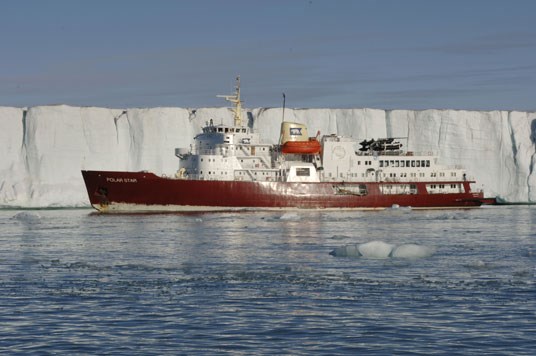Minister of the Environment Helen Bjørnøy:
The Norwegian Government ban the presence of Heavy Fuel Oil on board ships in Svalbards eastern waters
Historical archive
Published under: Stoltenberg's 2nd Government
Publisher: Ministry of the Environment
Press release | Date: 03/06/2007
On 1. June the Norwegian Government imposed a ban on the use of Heavy Fuel Oil onboard ships inside the two large nature reserves covering most of the territorial waters of eastern Svalbard. The Government also decided that ships sailing in these waters are not allowed to carry more than 200 passengers.
On 1. June the Norwegian Government imposed a ban on the use of Heavy Fuel Oil onboard ships inside the two large nature reserves covering most of the territorial waters of eastern Svalbard. The Government also decided that ships sailing in these waters are not allowed to carry more than 200 passengers.
- The purpose of these restrictions is to avoid spills of Heavy Fuel Oil and other heavy fuels to the vulnerable coastal environment of eastern Svalbard. A major spill of heavy fuel oil could seriously impact Svalbards vulnerable coastal environment. To limit the number of tourists visiting the eastern nature reserves is also necessary to avoid negative impacts on local flora and fauna, says Minister for the Environment Helen Bjørnøy.

On 1. June the Norwegian Government imposed a ban on the use of Heavy Fuel Oil onboard ships inside the two large nature reserves covering most of the territorial waters of eastern Svalbard. Photo: Arne Nævra, Scanpix.
Most ships sailing on eastern Svalbard are either cruise-ships or fishing-vessels. The volume of cruise-tourism has increased considerably during the last 10-15 years, and there is a considerable potential for further growth. At the same time, navigation is particularly challenging in these waters due to drift-ice, low temperatures, shallow waters and lack of modern nautical maps. In these remote areas it will also be almost impossible to have oil spill response equipment in place in time in the case of a major acute spill of heavy fuels. Spills of lighter fuel oils, such as diesel, typically have smaller and more transient effects on the environment.
- To keep the risk of damage to the environment at a minimum, only ships using a very high quality of light fuel oil (DMA) will from now on be allowed to sail inside the nature reserves on eastern Svalbard, Bjørnøy underlines.
The Norwegian Government has also decided that ships sailing inside the eastern nature-reserves will not be allowed to carry more than 200 passengers.
- We have imposed this limit to prevent the large cruise-ships which are today operating on Western Svalbard from starting to use also Svalbards eastern waters. This measure will limit the number of tourists going ashore on various sites, and ensure that disturbance of wildlife and other environmental impacts are kept at low levels inside the nature reserves of eastern Svalbard
The waters surrounding Svalbard are home to large populations of seabirds and sea-mammals, and are highly vulnerable to oil-spills. On Svalbard, Norway are managing one of our last true wilderness areas, with an almost intact natural flora and fauna and only very limited impacts from local activities on the natural environment.
- Through effective conservation measures we intend to keep Svalbard this way also in the future, says Bjørnøy.
To achieve this, comprehensive conservation measures have been implemented on Svalbard. 65 per cent of Svalbards land-areas and 84 per cent of the territorial waters have been protected as nature reserves and national parks. The protection of local fauna is also extensive.
- My intention is to develop and strengthen these conservation measures to meet the challenges from a growing tourism and expanding oil-and gas activities of the northern seas. With regard to cruise-tourism, I will forward a proposal to ban the use of Heavy Fuel Oil also within the national parks of Western Svalbard. I will also forward a proposal to restrict the access to some of the most valuable and vulnerable areas of the eastern nature reserves to ensure their ecological integrity as reference areas for environmental monitoring and research activities.